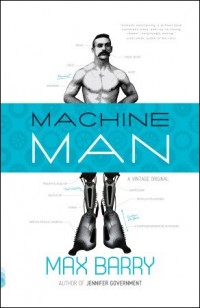I liked pretending my body was two hundred tons of unstoppable steel

Machine Man
by Max Barry
Max Barry was one of the first authors Tim introduced me to that he loved, back in the heady early days of our relationship when we were young and worried about agreeing on things like whether a book or film or album or TV show was complete genius. We’re over that now, but on Max Barry we still agree – he’s a great author and it is criminal that this book was never properly published in the UK (a Kindle version was eventually released in 2013, presumably after he signed a publishing deal for his new book Lexicon). Tim picked this up in the US and after waiting a year to let him to read it first, I gave up on that and read it for myself.
In fairness, Tim has read the first third or so of this before, albeit in its original unedited form. Barry did something a bit unusual with this book: he published the whole thing online in daily excerpts, initially free and later to subscribers only. Possibly this is related to the lack of a UK publisher, but the formally published version has been heavily edited because, as Barry concedes in his author’s note, what his online fans read (and often fed back on) was just a first draft, and one that was for the most part written on an odd schedule to meet the self-imposed daily deadline.
“As a boy, I wanted to be a train. I didn’t realise this was unusual – that other kids played with trains, not as them. They liked to build tracks and have trains not fall off them. Watch them go through tunnels. I didn’t understand that. What I liked was pretending my body was two hundred tons of unstoppable steel. Imagining I was pistons and valves and hydraulic compressors.”
The story is typical Barry – a sci-fi thriller with great characters, love, humour and a strong anti-corporate theme. Charles Neumann is a scientist and engineer working for Better Future, a large company with fingers in many pies. Charlie is socially awkward, probably autistic. Certainly, his reaction to losing his leg in an industrial accident isn’t a typical one, but in his voice it seems perfectly reasonable. He sees the opportunity to build himself a new leg that’s more than just a prosthesis. But then the artificial leg will be better than his remaining healthy leg, which poses a problem. Or is it an opportunity?
“I woke to a terrible cramp in my foot. Not the foot I had. The other one. I groped around in the dark, grimacing and clutching at empty sheets. I hauled myself upright and turned on the lamp and threw back the sheets. ‘See. Nothing there.’ I was talking to my brain. ‘Nothing to hurt.’ I leaned forward and pretended to massage the space where my toes would have been. As a scientist, I am not proud of this. But it seemed to help.”
An added romantic complication is Lola, the prosthetist, who is surprisingly sympathetic to Charlie’s way of thinking. And there’s a whole array of managers from Better Future whose reaction to Charlie’s surreptitious new project isn’t wholly expected either. He soon finds himself caught in a bewildering web of people he isn’t sure he can trust.
“I had been going about this all wrong. Biology was not ideal. When you thought about it, biological legs couldn’t do anything except convey a small mass from A to B, so long as A and B were not particularly far apart and you were in no hurry. That wasn’t great…If you were designing something within that limitation, then okay, good job. But if you weren’t, it seemed to me you could build in a lot more features.”
This book has some surprising plot turns (not exactly twists) and it definitely fulfils the thriller requirement of keeping you reading avidly. Charlie’s narration gives it all a fresh angle as he often doesn’t understand why people react the way they do, but of course as the reader you can see both sides. It’s darkly funny and also quite moving. I felt at times that this had a lot in common with Flowers for Algernon (which is my favourite sci-fi book) and I wonder if Charlie’s name might be a nod to that classic.
Published 2011 by Vintage Books.
Source: Tim bought it at the Last Bookstore, LA.